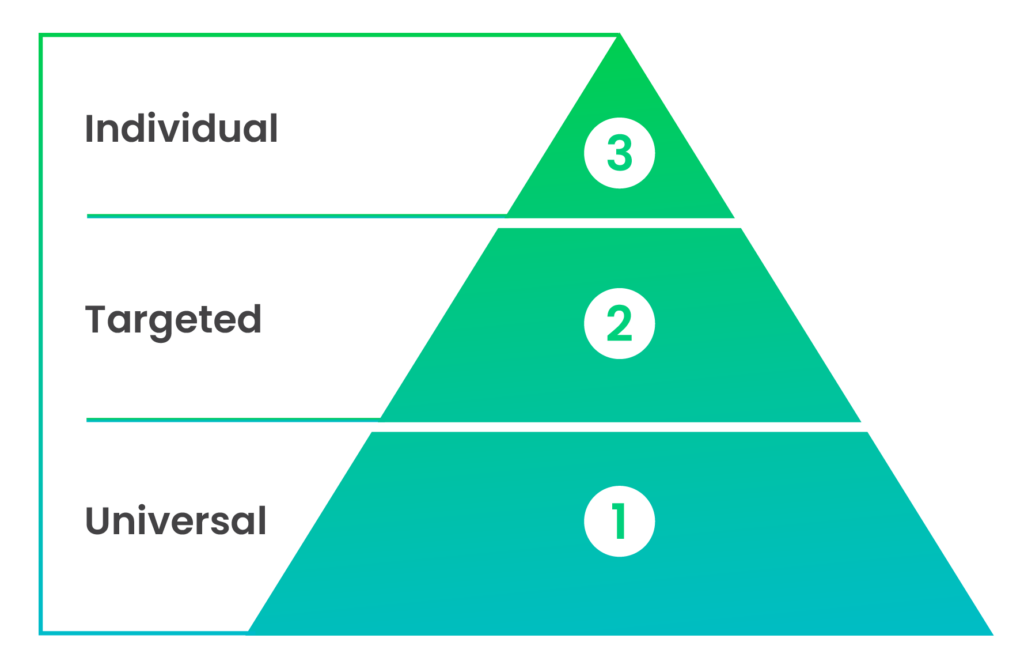Supporting all students at every educational stage is crucial. Every student deserves an equal chance to excel academically, behaviorally, and socially. The Multi-Tiered System of Supports (MTSS) framework addresses these diverse needs.
MTSS is a data-driven approach providing a continuum of supports for all students, tailored to each school and community. It’s designed to ensure that every student gets the necessary interventions and services.
Understanding MTSS Framework
MTSS is an educational model providing high-quality instruction that meets students’ needs. It’s preventive, identifying students early and providing targeted instruction to maximize achievement in academics, behavior, and social-emotional learning (SEL) development.
Importance of MTSS
Early identification and intervention address academic, behavioral, and SE needs, preventing severe problems later. Focusing on the whole child enhances student outcomes and promotes equity.
Core Components of MTSS
Universal Screeners: Assessments identify at-risk students in academics, behavior, and SE areas.
Tiered Instruction: Based on screening data, students receive varying support levels using evidence-based practices.
Progress Monitoring: Regular checks ensure interventions’ effectiveness, with adjustments as needed.
Students showing progress may move tiers, while those who plateau may need more intense interventions or evaluations for additional support.
Benefits of Implementing MTSS
Implementing MTSS creates a proactive and responsive educational environment that meets the diverse needs of all students, ensuring they have the support necessary to achieve their full potential.
Not only does it help schools to identify students in need of more support, but it improves student outcomes by reducing behavior issues, building SE capacity, and increasing academic growth. It also imparts on teachers the importance of using data-driven results to inform instruction and creates an equitable and inclusive environment.
The Tiers of MTSS
There are three tiers in MTSS, each with differing degrees of need, support, instentity, and interventions.

Tier 1: Universal Supports
Tier 1 includes universal support, or support for all students. These supports are provided in the general education classroom and are intended to promote successful academic, behavioral, and social-emotional outcomes for the majority of students (80-90%).
Examples of Tier 1 interventions:
- The general education standards-based curriculum
- Regular assessments
- School-wide expectations and Positive Behavior Intervention Supports (PBIS)
- Any whole school SEL programs
Tier 2: Targeted Supports
Tier 2 provides targeted interventions for students who are not adequately responding to Tier 1 supports. These students are identified through universal screenings and ongoing progress monitoring and should make up around 5-15% of the student population.
Examples of Tier 2 interventions:
- Small group instruction (4-6 students)
- Interventions that focus on a specific skill or deficit
- May focus more on explicit instruction
- Increased intensity and frequency of instruction
- Frequent progress monitoring – every 1-2 weeks
- Behavior Intervention Plan (BIP)
- SE supports, such a group counseling
Tier 3: Intensive Supports
Tier 3 intervention includes intensive and individualized interventions. This tier is for students who need more support than what’s provided in Tiers 1 and 2. It should include about 1-5% of the school’s population.
Examples of Tier 2 interventions:
- Small group (1-3) or individual
- Interventions that are tailored to each students need
- Increased intensity and frequency of instruction as compared to Tier 2
- More frequent progress monitoring – daily or weekly
- BIP and/or behavior mentor
- One on one sessions with School Social Worker
- Service provider intervention (SLP, OT, PT, etc)

Implementing MTSS in Schools
There are several steps to implementing MTSS in your school:
- Build a Leadership Team: Establish a team to oversee the MTSS implementation process, including administrators, teachers, and service providers.
- Conduct Needs Assessment: Evaluate current practices and identify areas needing improvement.
- Develop a Plan: Create a comprehensive MTSS plan outlining goals, strategies, and timelines.
- Choose Curriculum: Research appropriate curriculums that are evidence-based and will best fit your school and its needs.
- Train Staff: Provide professional development to ensure all staff understand MTSS and their roles.
- Implement Universal Screening
- Group Students: Use data to group students in the appropriate tiers.
- Provide Tiered Interventions and Supports: When properly implemented, tiered supports have consistent practices, data-driven decision making, collaboration, and professional development.
- Monitor Progress: Regularly assess students’ progress and adjust interventions as necessary.
- Evaluate and Adjust: Continuously review the effectiveness of MTSS and make necessary adjustments.
Teachers’ Roles in MTSS Implementation
Teachers are crucial in MTSS implementation. They deliver Tier 1 instruction, identify students needing additional support, implement Tier 2 and 3 interventions, and monitor progress. Teachers collaborate with specialists and adjust instruction based on data. They are a core component in a thriving MTSS system and need appropriate resources and development.
Professional Development
Ongoing training is vital for successful MTSS implementation. Educators need continuous support to stay updated on best practices and intervention strategies. Professional development, such as that offered by eLuma, provides educators with the necessary tools and knowledge.
eLuma’s programs focus on enhancing teachers’ skills in delivering evidence-based interventions, using data to inform instruction, and collaborating effectively within the MTSS framework. This continuous learning ensures educators are equipped to meet all students’ diverse needs.

eLuma’s Solutions
eLuma provides K-12 school districts high-quality online therapy and end-to-end student services to meet special education and mental health intervention needs, including IEP-based related services, universal screening, and professional development.
With eLuma, you gain access to a dedicated customer success team, experienced clinicians and providers, and a secure caseload management platform to address capacity challenges, remain compliant, and empower every student to achieve their potential.
eLuma provides online therapy services, including SLP, OT, mental and behavioral health, school psychology and counseling, and universal screening. Our platform facilitates access to qualified professionals through secure, FERPA-compliant video conferencing, ensuring convenient and effective therapy sessions for students.
Integration into the MTSS Framework
eLuma’s services seamlessly integrate into the MTSS framework by:
- Tier 1: Providing universal access to assessments and screenings in speech, language, and behavior.
- Tier 2: Offering targeted interventions such as small group therapy sessions tailored to specific student needs.
- Tier 3: Delivering intensive, individualized therapies and counseling to students requiring more specialized support.
By aligning with MTSS principles, eLuma helps schools address academic, behavioral, and SEL challenges comprehensively, ensuring all students receive appropriate levels of support. Check out one of our success stories demonstrating the positive impact of eLuma’s services.
eLuma offers comprehensive online therapy services that seamlessly integrate into the MTSS Framework, addressing academic, behavioral, and SEL needs. Our platform provides universal screenings and assessments, targeted small-group interventions, and intensive, individualized therapies. By leveraging secure, FERPA-compliant video conferencing, eLuma ensures convenient access to qualified professionals for effective therapy sessions.
eLuma’s approach supports consistent practices across all MTSS tiers, facilitates data-driven decision-making through regular progress monitoring, and promotes collaboration among educators, support staff, and families. Our commitment to ongoing professional development equips educators with the skills needed to implement evidence-based interventions and enhance student outcomes within the MTSS framework.
Schedule a free consultation and discover how eLuma’s services empower schools to meet diverse student needs effectively, fostering a supportive environment that promotes academic success and holistic development.


